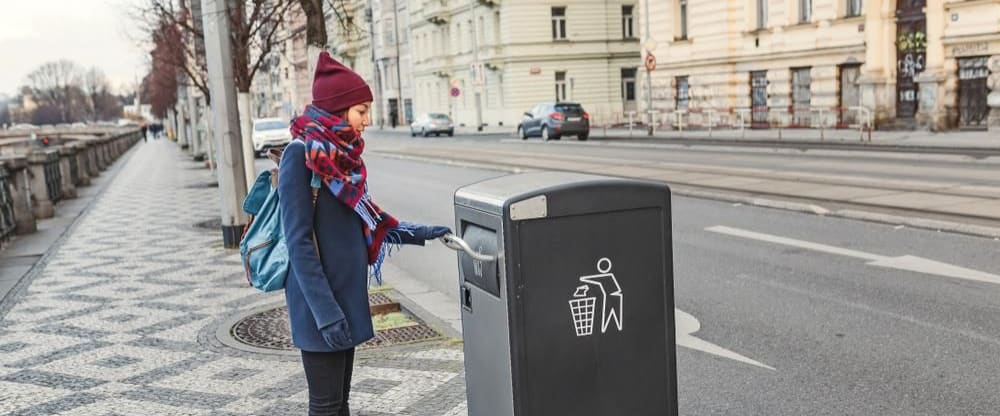Five Habits You Might Pick Up While Studying Abroad
Living in a foreign country means acclimating to things you might not have encountered back home. While these different ways of doing things may taking some getting used to, it’s ultimately a good thing: We all can stand to learn from each other. Read on for a roundup of five specific habits and behaviors you might encounter while studying abroad.
- Study Abroad
- Student Tips

Living in a foreign country means acclimating to things you might not have encountered back home. While these different ways of doing things may taking some getting used to, it’s ultimately a good thing: We all can stand to learn from each other. Read on for a roundup of five specific habits and behaviors you might encounter while studying abroad.
1. Recycling in Sweden
While most countries are making some effort to go green, . In fact, it’s got the recycling thing down so well that less than one percent of the country’s household trash ends up in landfills. Not only that, but Sweden now to import garbage from other countries in order to keep its recycling plants up and running.
While studying in Sweden, you’ll be expected to amp up your own recycling efforts. , “I remember moving into my corridor at the beginning of the semester. I saw dozens of different bins. When I realized it was for recycling, it made me laugh: I immediately assumed that nobody would really respect these rules. I was wrong!”
Adds a French student, “Before coming to Sweden I thought it was a very environmentally friendly country, quite aware of what is at stake today with global warming. I was not disappointed, Swedes have already adapted their habits.”
If you’re not familiar with sustainability issues or you’ve lapsed in your own recycling efforts, take the opportunity to learn from the Swedes. Enthuses a German student of her time in Sweden, “My habits definitely changed! And I wish everyone could make a similar effort to promote a more conscious way of living.”
2. Showering in Brazil
Sure, you shower. But it’s highly unlikely you shower as frequently as Brazilians. , “If you have been to Brazil or have Brazilian friends you already know that Brazilians take showering very seriously. The average Brazilian showers at least twice a day. The weather is sticky and people think nothing of showering once in the morning and again at night. In the humid summer, some Brazilians take as many as four showers in one day.”
The takeaway? While showering multiple times a day may not be part of your international studies plans, the weather and the custom may lead you to change your mind.
3. Siestas in Spain
Who doesn’t love a good nap every now and then? In Spain, napping is more than an occasional thing; it’s a way of life.
, “The siesta is one of the most famous aspects of Spanish life — that dead period in the late afternoon when everything shuts down in Spain, in theory, so people can rest and take a nap.”
While the siesta is gradually disappearing in Spain due to the changing workday, the reasons behind it remain valid: It offers people a refreshing break from the midday heat while making it easier to participate in the country’s vibrant nightlife.
But you don’t have to take our word for it. Instead, take the word of the Spanish Society of Primary Care Physicians (SEMERGEN), which officially condones .
4. Sharing meals in China
While some restaurants in Western countries serve meals “family style,” sharing meals is the norm in China and many other Asian countries.
, “In a Chinese meal, each individual diner is given their own bowl of rice while the accompanying dishes are served in communal plates (or bowls) which are shared by everyone sitting at the table....Each diner picks food out of the communal plates on a bite-by-bite basis with their chopsticks. This is in contrast to western meals where it is customary to dole out individual servings of the dishes at the beginning of the meal.”
If you're uncomfortable with the idea of letting your utensils touch a communal plate, keep an eye out for extra serving spoons or chopsticks often made available for the germ squeamish.
5. Carrying cash in Germany
Used to laying down plastic to pay for everything? Expect to change your ways in Germany, where cash is still king.
Particularly in smaller cities and towns, cash is still the preferred way to do business. In fact, a whopping 80 percent of German transactions are made in cash, . “The importance of cash cannot be overestimated. Before you enter shops or restaurants, check the doors - they often display stickers showing which cards are accepted,” advises the travel site.
Have you encountered any unexpected cultural behaviors or habits on your travels? If so, please share them in the Comments section below.

Joanna Hughes
Author
Joanna worked in higher education administration for many years at a leading research institution before becoming a full-time freelance writer. She lives in the beautiful White Mountains region of New Hampshire with her family.
Read related articles

Are International Students Immigrants? The Debate Explained

Six Things All International Students Should Do Before Traveling
